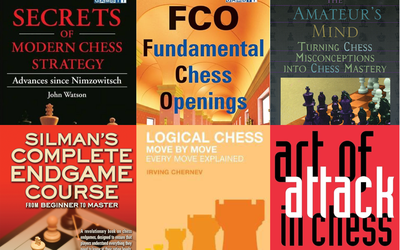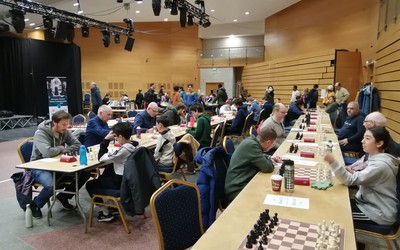
Irish Chess Union gives massive rating boost to Irish chess players
How I gained 400 points without playing a gameIt's no exaggeration to say that the chess world has undergone a major transformation since Covid. One of the biggest changes was the surge of new players entering tournaments. This is undoubtedly a positive as we all want more people to play chess, but it has lead to some unfortunate side effects.
All these new players began with low ratings as if they were beginners. But in many cases, this wasn't the case as they had spent months or years grinding away at online chess. During lockdown there was a huge surge in activity on chess websites like Lichess so when lockdown ended and tournaments returned, these people were far stronger than their low rating suggested.
In fact, I was one of these people. I lost my job when lockdown began and so I had a lot of free time to play chess. Over the course of 2020, I played chess almost every day and my rapid rating went from 1400 to 1900. When I entered my first over-the-board tournament in 2021, I was given a rating of only 700 (the starting level of all Irish Chess Union players), far below my actual strength. In that tournament, about three quarters of players were unrated. I quickly realised that although I was under-rated, so were my opponents and instead of easily winning, I got crushed by a 900 who played like someone with double his rating (in fact he hit 1800 two years later).
As I made my way up the rating ladder, I experienced this from both sides. I got the joy of over-performing and beating someone with a much higher rating, but also the frustration of losing to someone whose rating was much lower than their skill. After a while, I felt that the age of my opponent was just as important as their rating. If they were a teenager, then they were almost certainly far stronger than their rating and it would be a tough game. But if they were over 60, then their rating might be out-of-date and I would have a better chance.
FIDE takes action
This rating deflation had become such a problem that FIDE decided to take action. They ran some statistical analysis and found that lower rated players were performing better than they should against higher rated opponents, suggesting significant numbers of players were under-rated. They also found that there had been general rating deflation since 2021 as the influx of new players dragged the average ratings down.
Therefore, they decided to give everyone rated over 1000 and below 2000, a boost to their rating to combat the deflation. They also increased the minimum FIDE rating from 1000 to 1400. In my case, my classical rating jumped from 1506 to 1696.

ICU takes action
But this change created a major divergence between FIDE and national ratings. Up to this point, there was a gap of about 200 points between FIDE ratings and Irish ratings (although they were much closer for players over 2000). My ICU rating was around 1300 but my FIDE rating jumped from 1500 to 1700.
This caused several problems. Firstly, rating sections in tournaments became weaker, as players could just choose either their ICU rating if they wanted to be in a lower section or their FIDE if they wanted to be in a higher section. This lead to messy situations like where the DCU Open had a section that was under 1200 ICU and under 1650 FIDE while the next section was 1100-1600 ICU and 1450-1850 FIDE. As you can imagine, this is a clunky and confusing system.
Another problem is that international players can enter Irish tournaments with a FIDE rating, but this would lead to distortions when calculating the impact on their opponents ICU ratings. Worse still, Irish players can gain ICU rating points from playing in international tournaments, which could distort things even further.
On March 25th, the ICU announced it was considering updating the ratings of all players. In a short, two-page document, the ICU proposed updating ratings to bring ICU ratings in line with FIDE for essentially the same reasons. The main difference is that the ICU changes would be larger and there would be no change to the initial start rating of 700. A player rated 700 would become 1480, a 1000 would become 1600 and a 1500 would become 1800. Players 2000 and higher would see no change.
The changes were announced on May 16th, but backdated to March 1st. This gave all players and enormous rating boost with lower rated players receiving the largest increases. I received a 400 point boost from 1312 to 1726.

To show what this change looks like in practice, here is how the ratings of 15 players from my local club got changed.
| Old rating | New rating |
| 1484 | 1793 |
| 1312 | 1726 |
| 1300 | 1718 |
| 1183 | 1685 |
| 1070 | 1631 |
| 1071 | 1628 |
| 1007 | 1602 |
| 993 | 1597 |
| 982 | 1592 |
| 967 | 1590 |
| 930 | 1572 |
| 906 | 1562 |
| 885 | 1554 |
| 882 | 1552 |
| 780 | 1512 |
What now?
So, what will these changes bring? Previously, about one-third of Irish Chess Union players were under 800, one-third were between 800 and 1500 and one-third were above 1500. Now, the minimum rating seems to be about 1350 which will drastically change the tournament landscape. For example, the lowest section of the Drogheda Congress was under 1100, but now it will be under 1600. The 1000-1400 section is now the 1600-1799 section, and so on.

Obviously, this won't be permanent and a lot of these players will gradually lose rating points and sink back down. New players will continue to enter tournaments with new ratings of 700 and they will deflate the average ratings back down again. There will be a lot of fluctuation for a while as there will still be young players who are developing their skills rapidly playing against older players who did not receive quite as much of a rating boost.
Hopefully, the system will soon stabilise and provide an accurate reflection of players skill level. It seems to have succeeded in bringing ICU rating back in line with FIDE, I am currently rated 1696 and 1670 respectively. I don't think too many players will complain about gaining hundreds of points for free, my goal for 2024 was to break 1500, which I have already greatly overshot.
More blog posts by TeoKajLibroj

6 chess books I tried to read
And which ones I would recommend
Has the chess boom reached OTB tournaments?
Have Irish tournaments experienced the chess boom?
Kiel ludi ŝakon pli bone
Jen konsilo por kiel plibonigi vian ŝakon
